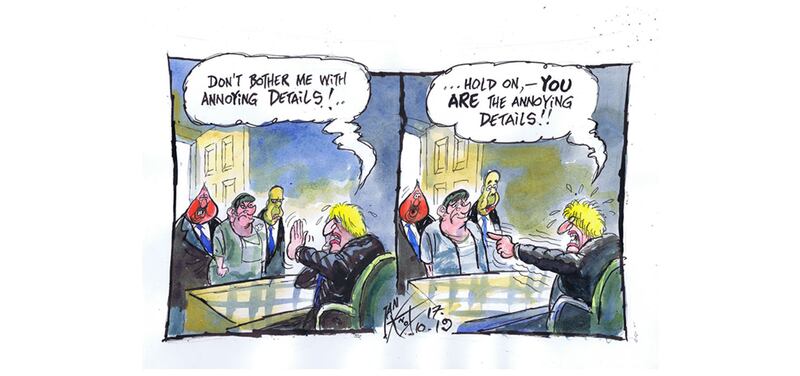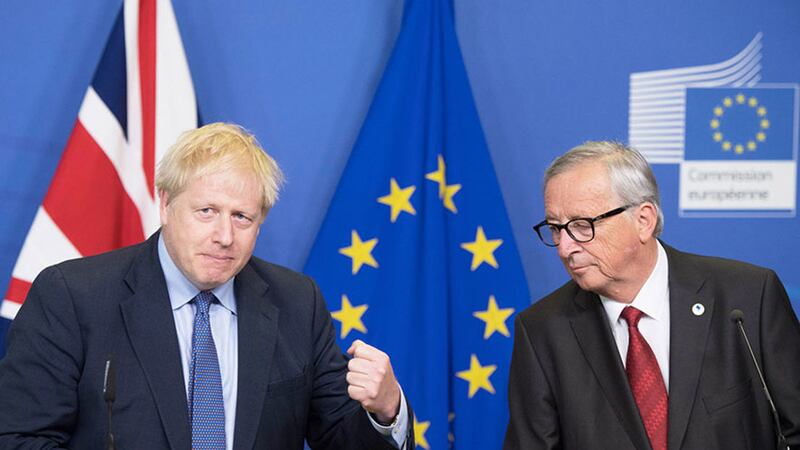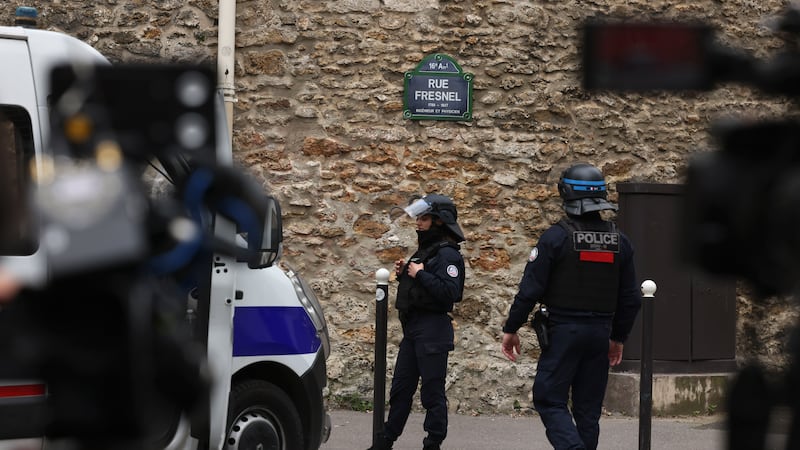Boris Johnson has announced that the British government has done a deal with the EU despite the DUP saying earlier today that they could not back his Brexit plans.
The British prime minister tweeted that a deal had been agreed and now Parliament "should get Brexit done on Saturday".
We’ve got a great new deal that takes back control — now Parliament should get Brexit done on Saturday so we can move on to other priorities like the cost of living, the NHS, violent crime and our environment #GetBrexitDone #TakeBackControl
— Boris Johnson (@BorisJohnson) October 17, 2019
Speaking at a press conference, European Commission chief negotiator, Michel Barnier said: "Throughout these negotiations the EU and UK were fully committed to protect peace and stability on the island of Ireland.
Read more:DUP rejects the deal claiming it will damage the economy and undermine the union
"Discussions over the past days have at times been difficult, but have delivered and we have delivered together."
Mr Barnier said the solution "rests on four main elements": that Northern Ireland will remain aligned to a limited set of EU rules, notably related to goods; Northern Ireland will remain in the UK's customs territory but will "remain an entry point" into the EU's single market; an agreement to maintain the integrity of the single market and satisfy the UK's legitimate wishes over VAT; Northern Ireland representatives will be able to decide "by simple majority" whether to continue applying union rules in Northern Ireland or not, every four years.
BREAKING
— Sky News (@SkyNews) October 17, 2019
"It doesn't meet our demands and expectations." @jeremycorbyn says Labour is 'unhappy' with @BorisJohnson's deal and 'as it stands' the party will vote against it.
Follow live #Brexit deal updates here: https://t.co/yImFz9ar7j pic.twitter.com/r5QjuIaVw0
The revised protocol on Northern Ireland contains four key elements, two of which are on regulations and customs:
Regulations:
Northern Ireland will remain aligned with Single Market regulations on goods. Checks and procedures on such goods will take place at ports and airports in Northern Ireland and not on the border. The UK authorities will therefore assume responsibility for applying the EU rules in Northern Ireland.
Custom duties:
Northern Ireland will remain a part of the UK's customs territory, so it will be included in any future trade deals struck by the Government after Brexit. However, the region will also remain an entry point into the EU's customs zone. UK authorities will apply UK tariffs to products entering Northern Ireland as long as they are not destined for onward transportation across the border. For goods at risk of entering the single market, the UK will collect EU tariffs on behalf of the bloc.
The other key elements of the Northern Ireland protocol are on VAT and consent:
VAT:
EU rules on Value Added Tax and excise duties will apply in Northern Ireland, with the UK responsible for their collection. However, revenues derived will be retained by the UK.
The UK will also be able to apply VAT exemptions and reduced rates in Northern Ireland that are applied in Ireland.
Consent:
Stormont Assembly members will vote whether to continue to apply the arrangements after an initial four-year period following them coming into effect at the start of 2021.
Significantly, that vote will be conducted on a simple majority head count at Stormont and will not require the support of a majority of unionists and a majority of nationalists under the contentious "petition of concern" mechanism. This means the DUP will not have the chance to exercise a veto.
If the vote is carried, the arrangements will be extended for another four years.
However, if it transpires that a majority of unionists and a majority of nationalists do ultimately vote in favour of the move, then the extension period will be for eight years.
If members vote to come out of the EU arrangements there would be a two-year cooling off period before that happened.
Read more:DUP rejects the deal claiming it will damage the economy and undermine the union
The PM's spokeswoman said she did not know if the Conservative Party leader had held further talks with the DUP after the flagged concerns regarding the terms of the exit deal.
"The PM has been in regular contact with the DUP," she said.
"I don't actually know if he spoke to them this morning but he has certainly been speaking to them regularly in recent days."
Instead of the easiest deal in history, we now face a choice between a catastrophic no deal and a worse deal than the backstop and one which will struggle to pass in Parliament.
— Naomi Long MEP (@naomi_long) October 17, 2019
People were promised unicorns in 2016: now, they're being offered donkeys.
Shameful state to be in.
Tánaiste Simon Coveney described the last-minute Brexit deal as a "big step forward".
Mr Coveney urged caution over the deal, telling the Irish parliament that a lot needs to happen over the coming days before there is certainty.
He said the deal ensures that there are no checks between Northern Ireland and the Republic and this is a "significant achievement".
"The first thing I would say is to urge caution", the foreign affairs minister said.
Read the revised Brexit withdrawal agreement

What has changed in the deal relates to Northern Ireland, he added.
Mr Coveney told the Dáil that the Dublin government has always been open to backstop alternatives as long as the same outcomes can be reached.
Mr Barnier said the British prime minister assured him and Mr Juncker he had the confidence to get the deal through Parliament on Saturday, despite not having a working majority.
Brexit deal: Full list of negotiating documents
He said: "Mr Johnson said to President Juncker this morning he has faith in his ability to convince the majority he needs in the House of Commons.
"He said based on this agreement and the explanations he intends to give, he has confidence in his ability to win that vote."
Boris Johnson has said: "We will leave the EU's Customs Union as one United Kingdom and be able to strike trade deals all around the world," after announcing a new Brexit deal.
In a Twitter thread, the prime minister continued: "This new deal ensures that we #TakeBackControl of our laws, borders, money and trade without disruption & establishes a new relationship with the EU based on free trade and friendly cooperation.
"This is a deal which allows us to get Brexit done and leave the EU in two weeks' time, so we can then focus on the people's priorities and bring the country back together again.
"This new deal takes back control. Under the previous negotiation, Brussels maintained ultimate control and could have forced Britain to accept EU laws and taxes for ever.
"We will leave the EU's Customs Union as one United Kingdom and be able to strike trade deals all around the world."
Mr Johnson added that the "anti-democratic" backstop had been abolished.
He tweeted: "The people of Northern Ireland will be in charge of the laws that they live by, and - unlike the backstop - will have the right to end the special arrangement if they so choose."
The DUP had said in a statement released this morning that they would be unable to back Mr Johnson's plan, highlighting three major obstacles.

"As things stand, we could not support what is being suggested on customs and consent issues, and there is a lack of clarity on VAT," they said.
The party later released a further statement, rejecting the deal which it claimed would damage the economy and undermine the union.
he DUP had been digging in over the prospect of a customs border between Northern Ireland and the rest of the UK, as well as the issues of consent regarding the suspended Stormont assembly.
Another major issue was whether EU VAT rates would apply in Northern Ireland.
Where there is a will, there is a #deal - we have one! It’s a fair and balanced agreement for the EU and the UK and it is testament to our commitment to find solutions. I recommend that #EUCO endorses this deal. pic.twitter.com/7AfKyCZ6k9
— Jean-Claude Juncker (@JunckerEU) October 17, 2019
The PM spoke by phone with European Commission president Jean-Claude Juncker at 9am before speaking with Cabinet colleagues.
By 10am, Mr Johnson rang Mr Juncker back to finalise the deal, the Downing Street spokeswoman added.
The focus will now switch to the British parliament which is set to hold a vote on the deal on Saturday.
Labour leader Jeremy Corbyn was quick to dismiss the deal.
"From what we know, it seems the prime minister has negotiated an even worse deal than Theresa May's, which was overwhelmingly rejected," he said.
"These proposals risk triggering a race to the bottom on rights and protections: putting food safety at risk, cutting environmental standards and workers' rights, and opening up our NHS to a takeover by US private corporations.
"This sell-out deal won't bring the country together and should be rejected. The best way to get Brexit sorted is to give the people the final say in a public vote."
The next few days will shape the future of our country for generations. I am more determined than ever to #StopBrexit and give the public the final say in a #PeoplesVote. https://t.co/bZWK17zmyf
— Jo Swinson (@joswinson) October 17, 2019
SDLP leader Colum Eastwood said his party would support the deal if it avoids a hard border:
We will study the proposal carefully but our fundamental principle remains that we need to avoid a hardened border on this island. If the deal does that we will support. I would urge Arlene Foster and the DUP to remember what's important. We can't go backwards.
— Colum Eastwood (@columeastwood) October 17, 2019
Scottish First Minister Nicola Sturgeon has confirmed SNP MPs at Westminster will not vote for the new Brexit deal - warning that a "much harder Brexit beckons" if it passes.
She tweeted: "For Scotland, this deal would take us out of EU, single market and customs union - all against our will. It would leave us as only part of UK being taken out without consent and with no say on future relationship. theSNP will not vote for that."
Ms Sturgeon added: "MPs should not fall for a deal/no deal framing. No Brexit/revoke is always an alternative to no deal."
And she insisted: "Brexit has shown that the only way for Scotland to be in charge of our own future is to become independent - that why we must have #indyref2 next year."
Green Party MP Caroline Lucas tweeted: "PM is trying to railroad through a deal which will set course of UK for generations, with no parliamentary scrutiny, no independent analysis & no guarantee rights are protected. Parliament must be able to scrutinise fully & it must go back to people for #finalsay"
PM is trying to railroad through a deal which will set course of UK for generations, with no parliamentary scrutiny, no independent analysis & no guarantee rights are protected
— Caroline Lucas (@CarolineLucas) October 17, 2019
Parliament must be able to scrutinise fully & it must go back to people for #finalsay#PeoplesVote https://t.co/4hxQvAj5Bw
Brexit Party leader Nigel Farage said that the UK will not be able to "properly break free" of the EU if the country signs up to the deal.
He then added he thinks it will be "very difficult" to get the DUP on board given that "effectively they've been hived off, almost annexed out of the European union there will be no friction less trade between the United Kingdom and Northern Ireland."







